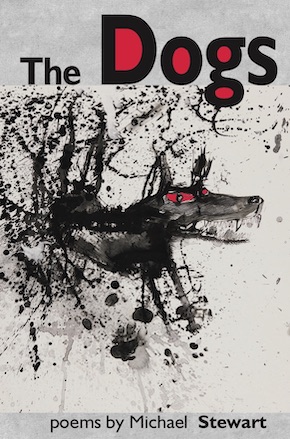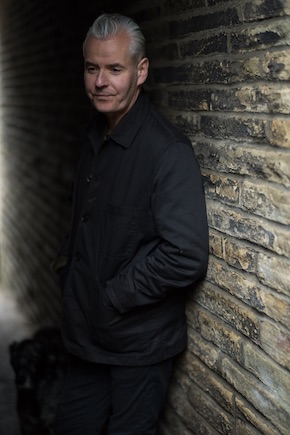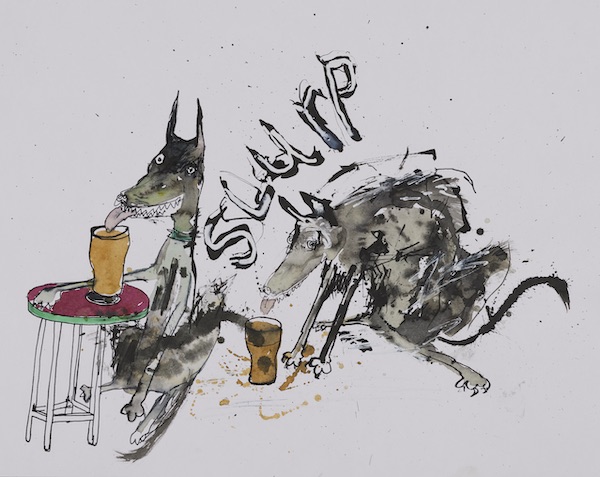from The Dogs
by Michael Stewart
This book came about from an encounter. Every day for over ten years, I passed a dog tethered in a yard on Low Lane near where I lived. He was guarding a pile of scrap metal. His only shelter was a corrugated sheet. He had a bowl of rainwater and his leash allowed him little freedom. Every day two men would appear in a flat backed van, piled high with old fridges, broken microwaves, burnt out pans, rusted toasters, disused brackets, and other metal bric-a-brac. They would unload the van. It normally took a few minutes. Then one of them would open a tin of unbranded dog food and pour it onto the floor near to the dog. The dog would eat this greedily, then the men would get back in the van and drive off. They never touched the dog or spoke to him. That interaction was his only human contact. In the winter I saw him shivering beneath his shelter. When the frost came I saw icicles cling to his matted fur. I rang animal charities but they weren’t interested. What the men were doing was not illegal. I thought about rescuing the dog, but I already had a dog and he would be disturbed by the presence of another. I thought about liberating the dog, opening the gate and cutting the rope, but how would he survive on his own? I thought about putting the dog out of his misery, but I’m not a killer. I had nightmares about that dog. I would wake up in the middle of the night, tortured by the image of this creature. I thought about trying to reason with the men, but I knew they would just give me a load of abuse. From their perspective, he was none of my business. In short, I wracked my brains trying to find a solution, but none came. Then one day, I passed the yard, and the dog had gone. I felt relief. Had he died? At least he would suffer no more. But then, a few weeks later, I saw his replacement. They had another younger dog, tethered to the same post. I never walked past that yard again. This book is dedicated to the dog of Low Lane, and all the dogs around the world that never experience warmth, adequate shelter, or comfort.
This, then, is a book about dogs, but it is also a book about us. What we have done, continue to do, and why we go on doing it.”
I started to think about writing a book about dogs. I wanted it to be in three parts. The first would deal with the various origin myths of dogs, their pre-history, their place in the world before they were co-opted into our society, and how those early societies regarded them. The second would look at dogs today, beginning with the formation of the Kennel Club by MP Sewallis Shirley in 1873, up to the present day, focusing on the various deformities we have imposed through the concept of ‘pure’ breeding and dysgenics. Finally, the book would explore an imagined future where dogs have developed the power of speech and are demanding rights of autonomy. In this imagined future, two main protest groups form: the UnderDogs, and Der UberHünd. The first being a peaceful, non-violent direct-action group. The second being an ‘any means necessary’ radical splinter from this group that advocates a more extreme approach.
This, then, is a book about dogs, but it is also a book about us. What we have done, continue to do, and why we go on doing it.
—
Corinthians 13:12
He looked at the creature and frowned,
I like him, I do, but could you make him smaller?
His legs are too long,
his ears too pointy,
his tail too bushy.
So they took him away and returned with another,
That’s better, only
could you make his eyes bigger?
His snout rounder?
Could you make his legs thinner?
They picked up the beast and left.
Now we’re getting there, he said.
I like his size and face
but his fur is too curly.
Could you make it straight?
And the colour is too dark.
Can you make it light?
I think we’re almost there, he said,
the next year when they came back.
We just need to make him more docile.
He’s a bit boisterous.
And I don’t want him humping my leg –
can we get rid of those things?
Can you make his nose smaller?
His fur shorter? His mouth neater?
They were gone for another year.
The next winter he welcomed them
into the hall with the full-length mirror.
He’s perfect, he said,
as he stared at his own reflection.
—
The Rapture
Since Judgement Day
Dogs haven’t seen any people.
Not one was left behind,
neither the miserable sinners
nor the sanctimonious saints.
The ordinary miscreants,
no one left.
Dogs roam the streets,
sleep in the beds of men.
They meet up in empty pubs:
the Black Horse, the Brown Cow, the Red Lion.
They slurp pints of stale stout.
Scoff packets of out-of-date scratchings.
They run down Tumbling Hill
and gather at the edge of Gap Lane,
eat dead rats and piss in the snow.
The nights are cool, the days
are hot, the sea is blue, the beach
is soft. The land is shining
now that it has gone to the dogs.
—

Michael Stewart’s books include the poetry collection Couples, the novels Café Assassin, Ill Will and King Crow (winner of the Guardian’s Not-the-Booker Award 2011), the memoir Walking the Invisible and two short story collections, Mr Jolly and Four Letter Words. He is the creator of the Brontë Stones project, monumental stones inscribed with poems by Kate Bush, Carol Ann Duffy, Jeannette Winterson and Jackie Kay. He teaches Creative Writing at the University of Huddersfield. The Dogs, illustrated by Louis Benoit, is published by Smokestack Books.
Read more
michael-stewart.org.uk
@headspam
@LouisBenoit17
@SmokestackBooks
Author photo by Craig Sugden


